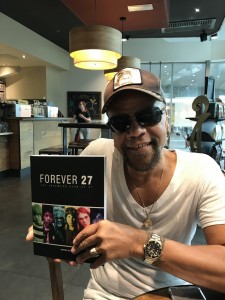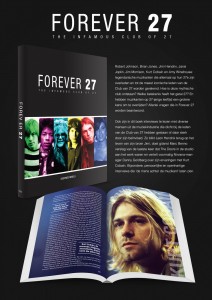It was a great honour for me giving a copy of my new book Forever 27 to John Hayes, guitarist of the legendary band Mother’s Finest. I took the opportunity to talk to John about the music of the infamous Club of 27: “They do still live forever. And they live forever young. Nobody will ever see an old, grey Jimi Hendrix. Or Janis Joplin. They will always be beautiful in every picture.”
What does the music of the 27 Club mean to you personally?
“I know that a lot of people who were in that club were cutting edge musicians. And that a lot of them died at the peak of their creative career. When you’re 27 you have a lot of creative energy. You haven’t really even tested the last boundaries of what you can do. These people were definitely really creative artists in their prime.”
Were the musicians of the 27 Club an inspiration for you as a musician?
“Yeah, I think so. Especially Jimi Hendrix. He was a big inspiration for me. I’m old enough to remember when he died. I was a kid, only 6 or 7 years old. I remember that when he died I was sad, because I really liked his music. And I liked what he stood for, his energy and everything. I remember I was sitting with my parents, having dinner, and the tv was on and someone said: Jimi Hendrix died. A few weeks later Janis Joplin died. I remember that as well. I wasn’t that much into Janis Joplin. I thought she was cool but I really did admire Jimi Hendrix a lot. Jim Morrison was cool too. I wasn’t a huge Doors fan, but he seemed like the kind of guy that was going to kill himself anyway. Do you know what I mean? To me he had a kind of dark spirit that he was going to go anyway. And Kurt Cobain… I actually saw Nirvana in Atlanta, just a few months before he killed himself. Their second album was just out and Nevermind had already been done. They were at their peak. A few months later he committed suicide. But that was one of the best concerts I have seen! I thought he was really good. I think he was underrated as a musician because he was part of that grunge movement, where it was a kind of an anti-musicianship attitude. But when I saw the concert, he was a pretty good singer and guitar player. I didn’t have an idea that he would die because he seemed pretty cool and energetic that night when I saw him.”
Looking at the musicians who died at 27, do you believe that there is something about that age?
“I don’t know much about that. In my opinion that’s over though out. Maybe they just happened to peak at that time. When you are that age, you definitely still feel immortal. You don’t feel like anything can kill you. When I was 27 too, I was having a really fun lifestyle. And it didn’t seem that it would ever slow down, you know? So I think the age was probably just a coincidence.”
One of the people I interviewed for my book was Danny Goldberg, the first manager of Nirvana. He once said that there is something about being in your twenties that makes people vulnerable. Do you understand what he means by this?
“I guess I understand it in a way. I think a lot of the people of the 27 Club weren’t particularly into the money aspect of it, as much as they were into the spiritual aspect of their music. And of course into drugs. That was their spirituality too. A lot of people have religion or meditation, but a lot of musicians have also enjoyed drugs. It was part of what was accepted. Most musicians have tried drugs and alcohol. That’s part of the gig, you know? And back then people didn’t really know about the side effects, that it would cause other complications, especially addiction and stuff like that. It was just cool to do.”
How did you manage to survive in the music industry?
“You’ve got to find a way. Because there is no way that you can keep up a lifestyle like that every day. What happened for me was, I started working out and going to the gym. If I had a pretty heavy night of partying or something like that, I would make sure that I would go to the gym the next day. Fitness was a good way for me to balance it out. I think that’s what a lot of musicians are doing these days too. Because nobody want to see a drunk musician on stage, you know? The audience can always tell when musicians are drunk or stoned, because there is a certain energy that drops off. Only a few people can do it perfectly, get stoned and make a great show. But most times your energy and your contact with the people dies when you’re stoned or fucked up or drunk. You think you’re doing a great job, but you’re not, you’re playing like shit. Maybe that’s what was happening with some of these guys. They were getting stoned and felt that they were losing their spirit. And they went into a downward spiral.”
For my book I also interviewed Leon Hendrix, Jimi’s brother. He told me that, if Jimi would have lived longer, he would have made a symphony for an orchestra. Other people believe that Jimi would have been playing jazz music. What musical direction do you think Jimi would have taken?
“In my opinion he would be playing anything that was on at the beginning edge, any music that was cool. Like when dance music became cool, he probably would be doing some dance music right about that time. And probably also classical stuff too. Right around the time he died, he was getting more into hardcore funk, with the Band of Gypsys. So he was definitely exploring the whole funk avenue as well.”
There are several conspiracy theories around the death of several members of the 27 Club. Do you believe these theories?
“Maybe… I guess that people of the management figured out that some of these artists are worth more dead than they are alive, you know? Because as soon as an artist dies, his record sales just blow up for a while. I know it was always suspected in the case of Jimi Hendrix. And also in the case of Brian Jones, because he was always screwing up a lot and maybe they wanted him out, because he wasn’t an asset anymore. Jimi Hendrix was getting rid of his big successful band and started getting into funk with Band of Gypsys. He was leaving this multi million dollar machine behind and trying out something different that on paper wasn’t supposed to be great. So yeah, I do believe that could be some conspiracy theories. Also there is the other theory too, about the whole deal with the devil, like with Robert Johnson. And that’s true. If you ever gonna have any success in music, you almost have made your deal with the devil. Once you start getting good money and fame, you kind of sold your soul. Also now with the whole social media thing, that‘s a little bit like selling your soul to the devil too. When you put your business out for all the followers to watch, it’s a little freaky, man. It’s quite devilish, haha!”
You just mentioned Robert Johnson. Why do you think his music is still popular today? What is the magic of the music of Robert Johnson?
“I guess it’s that primal thing that people love about blues. It’s also the raw storytelling in what he’s doing. It’s unapologetic. It’s about sex, drugs and rock ‘n roll. And also there’s the story of Robert Johnson selling his soul to the devil. But he was also one of the great recording artists that we know of. He just went into a studio, they turned on the recorders and he lives forever! That’s the other thing about these people too. They do still live forever. And they live forever young. Nobody will ever see an old, grey Jimi Hendrix. Or Janis Joplin. They will always be beautiful in every picture.”
What are your favourite songs of the 27 Club?
“The one with Brian Jones: Miss Amanda Jones. That’s a great one where he contributed in. That’s a killer song. Jimi Hendrix: I still love that 1983… (A Merman I Should Turn to Be). Janis Joplin: I guess Ball and Chain. What’s my favourite Doors song? People Are Strange, that’s a good song. Nirvana: I like the whole Nevermind album. That’s one of the best albums ever made. Amy Winehouse: I like that song Black. She is cool. I didn’t buy her records, but I liked her a lot. I couldn’t believe it when she died. For me, I’m glad I didn’t die at 27. I never partied like there’s no tomorrow. I mean, I partied really hard but not like there’s no tomorrow. There is always tomorrow. There is always another gig. You’ve got to be responsible for your tour, for the next thing you’re going to do in your career. I look forward to that.”
Het boek Forever 27 is onder andere verkrijgbaar bij Bol.com: www.bol.com/nl/p/forever-27/9200000103872937


